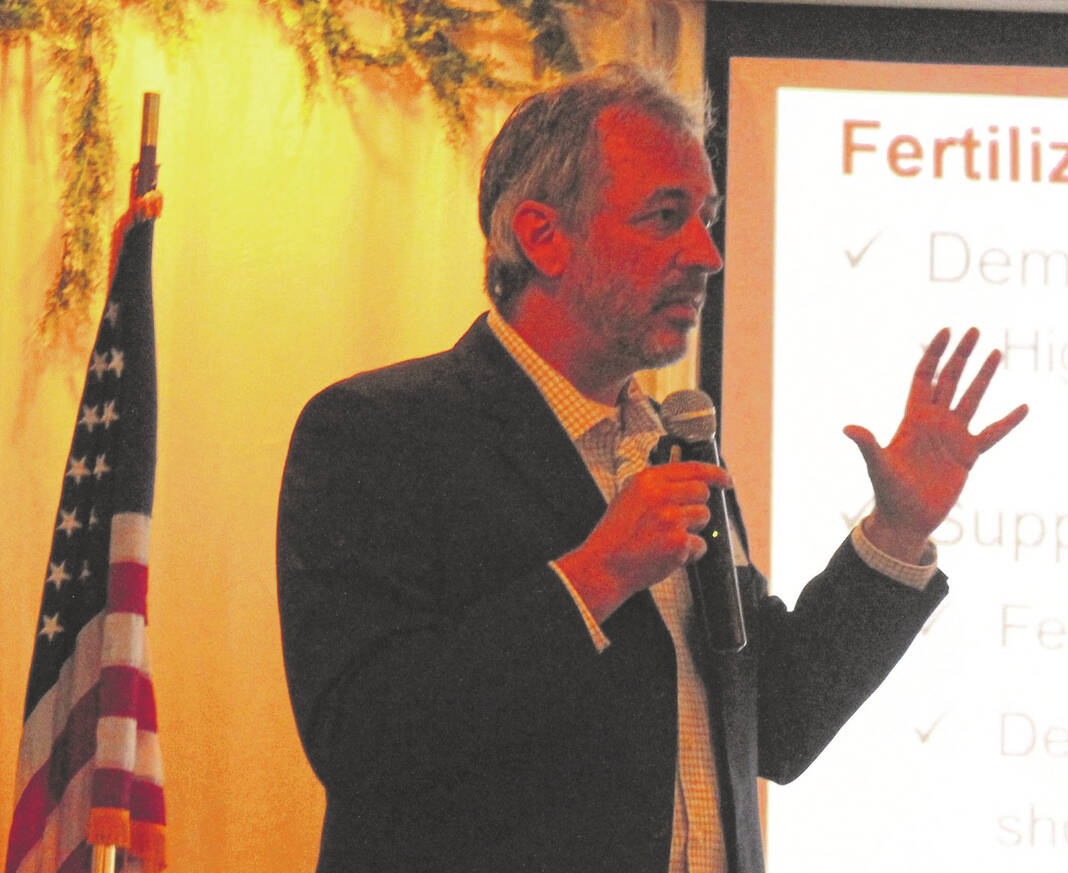
Chad Warner, recipient of the new Young Farmer Award.
Tammy Watts | Daily Advocate

Barry Ward, of the Ohio State University, discussed conditions affecting agricultural markets, and what to expect in 2022.
Tammy Watts | Daily Advocate
By Tammy Watts
DailyAdvocate.com
GREENVILLE — On March 25, the Darke County Chamber of Commerce presented Agribusiness Day at Romer’s Catering in Greenville.
Sam Suter, chairman of the Agriculture Committee, began the luncheon program, stating that for more than 60 years, Chamber Ag Day has been an event to honor agriculture, and to foster partnerships among farmers, agribusinesses, and traditional businesses. Last year, Darke County had 132,000 acres of corn planted; the most in Ohio, and was second-highest in acres of soybeans planted, at 145,500.
“We owe a huge debt of gratitude to the hardworking men and women who provide us with a safe, affordable, and abundant food supply,” Suter said.
Three awards were presented, including the new Young Farmer Award. The criteria for determining the honoree were: progress in his/her agricultural career, general farming and conservation practices, and contribution to his/her community. The first ever recipient of this honor was Chad Warner, of Warner Farms, a third-generation farmer. Warner farms 1,900 acres, utilizing non-GMO food-grade soybeans, and has diversified, adding malt and barley to the rotation.
“I thank my customers and supply base during these challenging times, or it wouldn’t be possible,” Warner said.
“But the best part about this award, is that it’s called the Young Farmer,” Warner chuckled.
Next, Edison State Community College’s Agriculture Program was recognized with the Agriculture Advocacy Award. The program was developed from the ground up, beginning in 2016, by offering a two-year degree in Agriculture/Agribusiness. Recently, a degree in Agricultural Maintenance was added, which includes ag science, industrial maintenance, mechatronics, and robotics. Fifteen students have graduated so far, and approximately 30 are currently enrolled, with another eight scheduled to graduate this year.
“Edison is doing a phenomenal job preparing students for careers in agriculture,” stated David Coons, of the Phelan Insurance Agency, and member of the Chamber Agriculture Committee.
As Edison State’s Agriculture Program Director, The Agriculture Achievement Award went to Brad Lentz.
“Under Brad’s leadership, the Edison State Agriculture program is thriving and has grown from a single degree program in 2016, to multiple associate degrees and certificates in 2022. Brad has an enthusiasm for agriculture, and passes that excitement onto his students each day,” wrote Chad Beanblossom, vice president of Regional Campuses, in Lentz’s nomination.
Upon accepting the award, Lentz said he had always loved farming, recalling his first spanking as a toddler, “I had just learned to walk, so I went up the road by myself to check on the cows.” Before his position at Edison, Lentz taught for 20 years at Ansonia Schools, also serving as FFA advisor. “With good support and great students, teaching is pretty easy,” he said.
Taylor Dill, of the Ohio State University Extension in Darke County, introduced Barry Ward, the keynote speaker. Ward, who is the director of the OSU Income Tax Schools, and Leader of Production Business Management, outlined conditions currently affecting agricultural markets, and what to expect in 2022. He stated that while the past two years were decent for farmers, with higher crop prices, production costs are also increasing, in some cases, exponentially.
Ward acknowledged that increased crop prices are a “mixed bag” for Darke County, as many farmers are invested heavily in livestock, and therefore experiencing higher costs for feed. In the past year, the price of herbicide has increased by 50 percent, diesel is up 60 percent, and some fertilizers are well over 100 percent of what they cost last spring. According to Ward, volatility in the fertilizer market comes down to supply and demand: U.S. sanctions on Russia and Belarus, and China’s halt of phosphate and UAN fertilizer exports, have resulted in shortages.
“Russia is a huge fertilizer exporter, and while we can get it from other places, fewer options means higher prices,” he said.
Unfortunately, supply and demand are not the only factors fueling higher prices. Ward cited a recent article published in the Wall Street Journal, in which a seed company executive stated that disruptions in the supply chain would be handled, by raising prices to compensate, “and then some.” According to Ward, the latter part of the statement indicated profit-taking by corporations will impact farmers as well.
Finally, Ward anticipated regional farm land prices to increase in value by as much as 20 percent, and that cash rental rates will be higher, compared to 2021.
Before and after the program, attendees had the opportunity to visit sponsor exhibit tables. Ron Barga II, co-owner of Premier Crop Insurance in Ansonia, spoke of market volatility during the past month, and the rising price of insurance due to surges in input costs. Erin Horst, also of Premier Crop Insurance, added, “It’s been difficult for farmers to make decisions on how best to protect every acre,” highlighting yet another challenge with which the agriculture community will have to contend in 2022.
Daily Advocate reporter Tammy Watts can be reached at [email protected].




